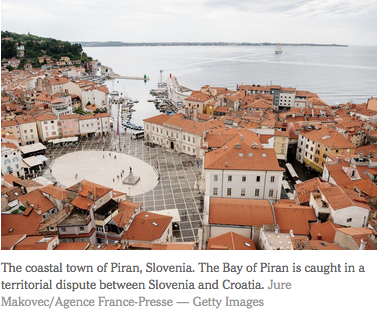This was supposed to be the year in which Slovenia and Croatia, members of the European Union and NATO, triumphantly ended a 26-year border dispute after an international court ruling in June. But it was not to be.
Slovenia backed the deal, but Croatia had already dropped out of arbitration, accusing Slovenia of breaching the process. The court gave the two countries six months to review the decision and prepare to carry it out.
The deadline expired on Friday.
The collapse of the agreement has left the European Union rattled and more than a little concerned, since it had aimed to use it as a model of amicable conflict resolution for the rest of the Western Balkan countries seeking to join.
Brussels, which had a tense 2017 because of the negotiations over Britain’s exit from the bloc, may be in for a far more difficult 2018, with long-running border disputes on the continent’s volatile southeastern flank.
Here is a look at the Slovenia-Croatia dispute and what’s at stake for the region, and the European Union.




